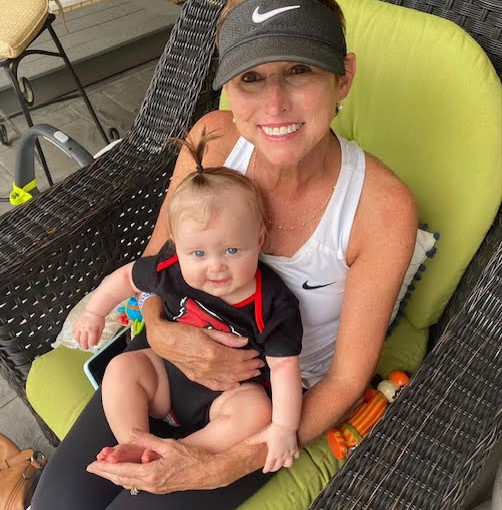CAROL O’BRYAN
In Loving Memory of Carol O’Bryan: A Valiant Fighter Against Pancreatic Cancer and Our Dear Friend
It is with deep sorrow that we announce the passing of Carol O’Bryan, who faced Stage 4 pancreatic cancer with remarkable courage and advocacy. Carol, a registered nurse from Louisville, Kentucky, was diagnosed on August 16, 2020, and since then, has been a beacon of hope and strength in her journey against this formidable disease.
Carol’s battle was not just for herself but for the broader community. She was a staunch advocate for clinical trials and genetic testing, believing firmly in the power of advanced medical research to pave the way for better treatments and outcomes for pancreatic cancer patients. Her participation in clinical trials and her decision to undergo genetic testing was a testament to her commitment to not only her own health but also the future of cancer treatment and research.
Even in the face of adversity, Carol maintained an optimistic mindset. She believed in living in the moment and found strength in spirituality, meditation, and yoga. Her story is not just one of battling a disease but also of embracing life with gratitude and positivity.
Our thoughts are with Carol’s family and friends during this difficult time. May her journey and fight against pancreatic cancer inspire us all.
You will be missed, Carol.
A Stage 4 Pancreatic Cancer Patient Advocates for Clinical Trials, Genetic Testing
Written By Julia Brabant
February 2022
Diagnosed: August 16, 2020
Current Status: Undergoing chemotherapy
The steps a patient takes in the wake of a pancreatic cancer diagnosis can impact everything from his or her own prognosis to the future of pancreatic cancer treatment and research.
Louisville, Kentucky’s Carol O’Bryan covered her bases, and her willingness to research her family’s risk factors, consider new and innovative treatment methods, and maintain an optimistic mindset along the way are among the many reasons she’s here today.
Carol, a registered nurse, began experiencing ongoing pain in her right side after eating during the summer of 2020. Thinking she might be having gallbladder issues, she had her son take her to the local emergency room, where the doctor performed a CT scan of her abdomen. The scan revealed that the gallbladder wasn’t the problem, but rather, lesions on her liver and pancreas, leading to a diagnosis of Stage 4 pancreatic cancer.
Carol soon underwent a liver biopsy, and doctors installed a port through which she’d receive medication once chemotherapy began. Within about three weeks, she began undergoing chemo using FOLFIRINOX, a combination of drugs often used for pancreatic cancer patients, under the direction of Dr. Michael Kommor, M.D., at Baptist Health in Louisville. She wasn’t a good candidate for surgery at the time because the cancer had already metastasized to her liver.
The chemo, while not easy, worked well, and Carol’s condition soon started to improve. CAT scans showed continued shrinkage in her tumors, and her “tumor marker,” which helps indicate the severity of the cancer, showed a promising downward trend.
Treatments continued until mid-2021, when Carol began experiencing an allergic reaction to oxaliplatin, one of the four drugs found in FOLFIRINOX. Her doctor removed that particular drug from her regimen, but she continues undergoing chemo every three weeks for the time being.
Clinical Trials & Genetic Testing
While she continues chemo, Carol and her doctor are also having her evaluated for consideration into a clinical trial.
“I’m very interested in clinical trials,” Carol said. “I know they’re hugely beneficial.”
Carol also underwent genetic testing following her diagnosis to see if she and her family members had any obvious predispositions that made them more susceptible to pancreatic cancer, or any type of cancer. She had no family history of pancreatic cancer. However, she did have a mother who survived thyroid cancer, two brothers who had prostate cancer (one of whom she lost 24 years to the day that she received her own diagnosis), and a father who died of lung cancer.
Genetic testing revealed two gene mutations – the ATR gene and the PHOX2B gene. Currently, the geneticist doesn’t see a genetic predisposition to pancreatic cancer, but the mutations will continue to undergo review.
Finding Strength in Spirituality
“I learned to live just for today,” she said, noting that meditation, yoga and daily inspirational readings have also become a part of her routine. “Most of the time, I see this as a tremendous gift. There’s less anxiety. I appreciate the days when I’m active and I go to bed thankful.”
She’s also learned to lean on God, her loved ones and other patients facing similar hurdles. She often reflects on some of the words Camille Moses, a nine-year pancreatic cancer survivor, shared with her about how she handled her own diagnosis.
“Only project positive thoughts,” Camille had said. “Keep busy, choose gratitude and believe in your care team. Cancer is a mental battle. And always know that someone out there has it worse.”
Carol also looks forward to a time when pandemic-related hardships no longer dictate her social life or keep her from doing other things she finds fulfilling. After retiring from her nursing career, Carol began volunteering at a health clinic that serves patients of limited means. While health risks prevent her from doing that at the moment, she’s readying to make a return – and even renewed her nursing license in preparation for doing so.
In the short term, Carol is grateful that Dr. Kommor gave her the green light to take a family trip to Florida, where her children will join her, in the coming weeks. She’s also eagerly awaiting the upcoming wedding of one of her sons and the March 15, 2022, first birthday of her first grandchild, Caroline – a child doctors initially said Carol might not live to see born.





You are my hero and a wonderful warrior